D.R. Congo - Land of Many Perils
In
Log in if you are already registered
"Casing Point" Exclusive: True Story about Adventure, Riches & Danger.

The most terrifying weapon in human history is unquestionably a nuclear bomb, but if we look at the real weapons of mass destruction it is in fact small arms, these cause more desolation then any explosion. I am sure, there are some who expect me to tell a story about AK-47 wielding maniacs from South Africa, who travelled to Congo in a bid to secure riches of this vast realm and at the end even save a damsel in distress. Sure, ZA mercenaries can be found throughout Africa, and Congo is by no means an exception, nor is the fear these mercenaries instil which almost cannot be paralleled as their typically ''well-built'' bodies and track-record of illicit activities makes most men shudder. Still, I said “almost”, because what appears as an insignificant tiny mosquito is far more deadlier than these morally defunct individuals. Henceforth - D.R. Congo - A Land of Many Perils: from mercenaries to warlords, from isolated tribes to imperialism torn locals, from tiny to big deadly god’s creatures. In this post we explore the 11th largest country in the world, yet one that receives relatively little notice. As usual, international relations will manifest, alongside adventure, riches and danger, in an account of our protagonist who nearly became this country’s remnant. Welcome To Congo!
Interview: 25/08/13; Moscow, Russia; Interviewer: Igor Ossipov; Interviewee: Mr X
Why Congo?
As any geologist would highlight D.R. Congo is an incredible place for minerals, as it features every single element from the Mendeleev’s Periodic Table. Moreover, unlike other mineral rich countries, like Russia or Canada, where much of the mining occurs deep in the earths crust with typically subzero temperatures above ground, in Congo not much equipment is needed to mine for some of the world’s most illustrious stones. I am clearly humorously exaggerating from a standpoint of efficiency, but technically this is all you need – the tools.
I included the “mosquito” as a deadly killer into the first paragraph, because it carries lethal malaria, which can quickly bring down even the healthiest of individuals. Now, most of you are now thinking that we live in the 21st century and our pharmacies are stacked with anti-malaria drugs. However, as our protagonist was in Africa/Congo for numerous years, from 2006, making anti-malaria drugs use impossible. These drugs can destroy a liver in a matter of 3 months, thus individuals that travel for an extended period of time, take an incredible risk by avoiding their use. However, this is just one of the dangers, in a catalogue of threats.
Thus, why in hell Congo? Well, with so much mineral wealth, the hunt for a notorious diamond, which can be worth $100,000’s if not $1,000,000’s only in the rough, makes some take the gamble. A diamond mine is an incredible site, as kimberlitic formations (pardon for technicalities, as I am not a geologist) can stretch for miles. Also, Congo holds about 75% of global reserves of tantalite. This is a highly prized mineral, as it is used in the manufacture of microchips that end up in most of our electronics – so, if you are using a computer, tablet or phone to read this, feel free to get a screwdriver and peek inside. Aside from the few examples included, there are plenty of other rare minerals that make the trip worthwhile for some – who perhaps shun from the typical mortgaged life, with two dogs and a reasonable pension scheme.
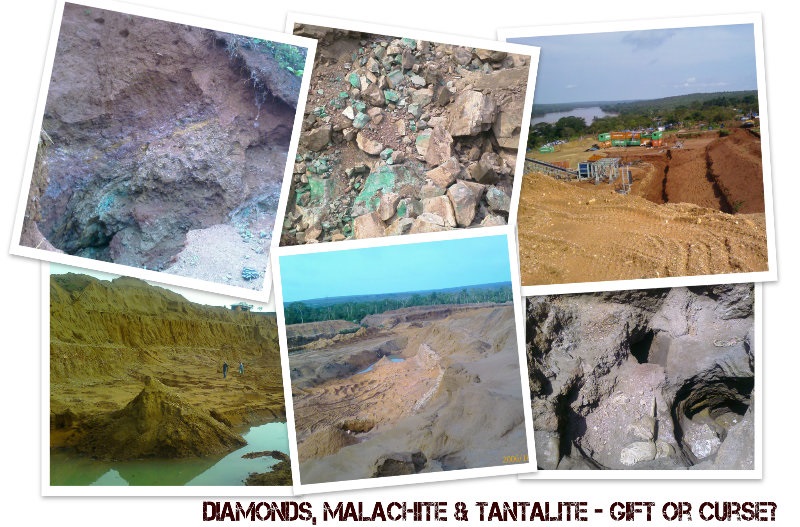
First Class Ticket to Paradise:
In the case of our protagonist, he was working for a legitimate company sponsored by wealthy Russian investors that thanks to their ventures in Africa, the Russian Far East and alike, have graced the tops of Forbes lists. Naturally, much of the travel was done in private jets to and from Congo – aside from the uncomfortable times when these broke down, resulting in a panic, as finding replacement parts in the mid of Congolese jungle is far from easy.
When in Congo, luxuries enjoyed across the Big Apple, Monaco and Moscow quickly became history, because fitting a Ferrari 360 on a Congolese road is an equivalent of an elephant on an M25 [except I am told there are no elephants left in natural habitat, as I will explain below]. Well, also, except M25 actually exists, when roads in Congo tend to be more or less non-existent – that is with exemption of dusty 'roads' that lead to and from major mineral mines. A major road which connected the two largest cities in the country, Kinshasa and Lubumbashi, existed a while back, but it degraded after “white colonists” left. A 'sure' way to travel in Congo, because your life rests in your own hands, is with a typical Congolese type vehicle – the 4x4 Toyota Land Cruiser of all and every single type, including locally 'pimped' versions. P.S. please, do take two at once, as if one breaks you might not be so lucky to make it back by lunchtime.
Now, the only way to travel among major Congolese cities is via 'local airlines', albeit this title is perhaps over-exaggerated, as these have an incredibly high tendency to not make it to the other airport – which is perhaps also an exaggeration as it is principally a few strips in the midst of vegetation. Congo, especially during its long rainy season experiences strong lighting storms that cause many fatalities, alongside the generally poor pilot skills of the locals. It is perhaps better to fly with ex-USSR pilots, who are here in abundance – a relic of USSR in their own way.

Economy Option or EasyJet’ish:
I have also included some photos of how locals travel, as you can see there is no such thing as not having enough room in your car, taxi, Congolese alternative to a Russian 'маршрутка', VW retro van, or local take on the 'National Stagecoach'. Those who are unlucky to afford such fine travel are left to stroll on what seem like the Congolese 'pavements'.
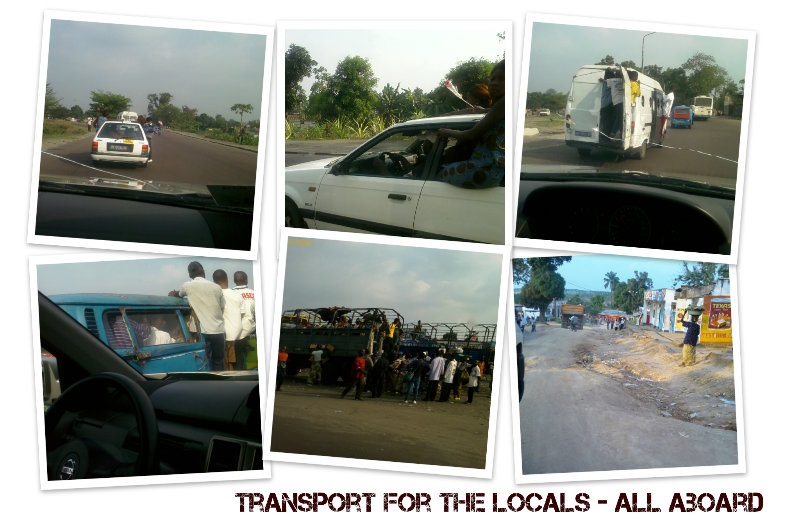
The Crew – Subzero Geologist in Sub-Hot Africa:
Any story involves more than one person and this one has plenty of people. However, one person from this crew of 'untouchables' impressed me the most. A simple Russian man from Norilsk, a city famous for its subzero temperatures (e.g. –50°C) and taught as a top geologist made many smile. As he got to Congo, many were flabbergasted to see this cheerful 60 year old walking around in temperatures nearing similar digits, just in opposite inclination (+30/+35°C). One time, accompanied by colleagues from South Africa, he was asked in a restaurant, whilst enjoying a few beers: “how can you not be hot, we are all baking?” – he replied – “I spend my whole life freezing, but after just 3 months I am still defrosting”. I hope, one day he will achieve his goal, but the South Africans will forever remain shocked to discover that such temperatures exist in the world, as in Norilsk.
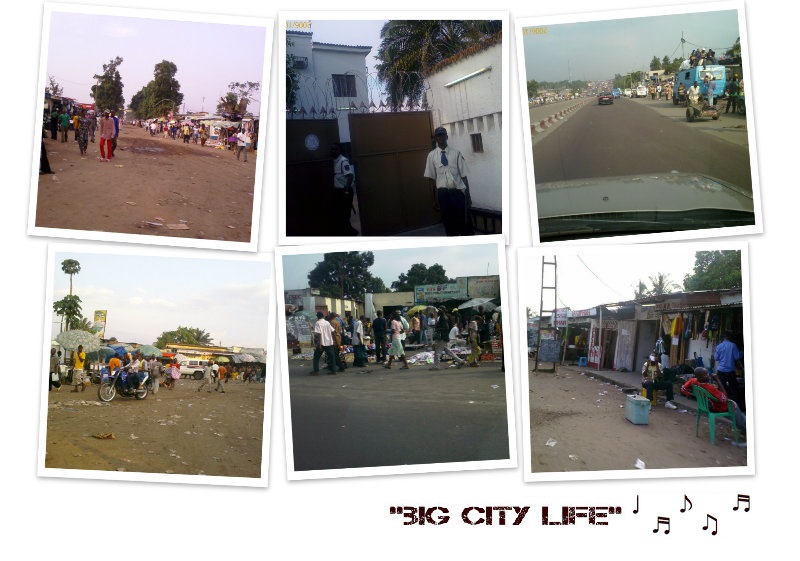
''International Relations'' – Capitalistic Imperialism vs. People’s Friendship
Now, if you think this kind of lifestyle suits your adventures side, then before buying a ticket to Congo, check your passport. As due to a long history of imperialistic abuse and capitalist extortion much of Western Europe and USA is despised – although this would be an understatement. People from Belgium are especially loathed in Congo. Interestingly, the fairly recent inflow of Chinese businesses is also detested, perhaps even more than the traditional enemies of Congo. The Chinese have made a bad name for themselves, by abusing locals with incredibly low wages and poor inter-personal relations.
I do not wish to give unnecessary PR to Russians, especially as some may find it hard to believe due to USSR being continuously depicted as an “evil empire” (cite: Ronald Reagan) by West’s academia and media. However, after spending several years in this region, our protagonist has never heard a single story of a Russian pilot or any other Russian being abused or hurt. Why? USSR has invested huge amounts of money into the region, they preferred to use soft power like education and healthcare – in contrast the USA used “chequebook” diplomacy by bribing the local elites, which just fuelled hatred. In the 1960s the Moscow’s famous Peoples' Friendship University was opened allowing for exchange of students and until early 1990s it held the name of Patrice Lumumba; an independence leader who was ousted from power in Congo, because of Belgium’s drive to acquire mineral resources.
The 'nightlife' in D.R. Congo as one can imagine does not match the standards of top end London club – with perhaps an exception of very friendly local women. Also, the latter is far less perilous as our protagonist found out one night; in an outside smoking area. Interestingly, the only people who are able to go to such places are either 'expats', local elites that sold stakes in the country’s ludicrously prized mineral assets, or local warlords. So, who do you think he met? Well, it was the latter, one of the people standing in a cloud of smoke turned out to be a local warlord on a night-out. Naturally, at first the unwanted discussion was very tense; especially as such people do not tend to walk about with a solitary Zippo lighter, a cheeky smile, or for that matter alone. Typically, French is spoken, as our hero knew French perfectly, it was at first difficult to deduct where he was actually from. How did he escape? Well, he did not escape; he made a 'good' acquaintance as this shady individual found out that our protagonist was Russian. We can now only wonder what would have happened, if our protagonist was from Belgium – though, I would most likely not be telling this story now or ever meet this contact.
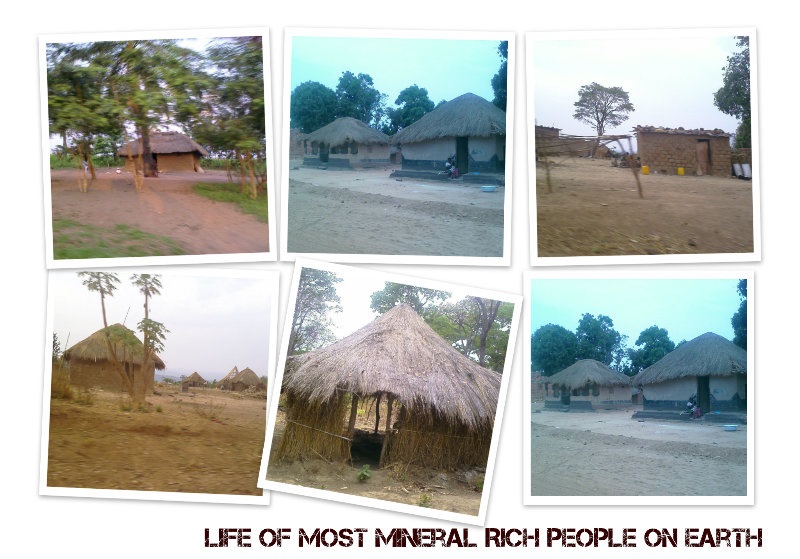
Bon Appétit – ''Congolese Gastronomy''
In any country, food can be equated to something of a 'postcard', or one of the most memorable experiences. As one can imagine, the plate of a Congolese person depends hugely on their social status.
There is no particularly strong segregation or racism, beside from the above mention nations. However, it would still be advised to travel in a company of black co-worker as it lowers the likelihood of a ‘nightclub event’. As with nightclubs, restaurants cater only for the very rich and prices can be very high, almost rivalling some Michelin star European restaurants. It is worth keeping in mind that consumption of water is a bad idea no matter where one eats. In fact, it is always good to gulp down 100ml of hard liquor prior to the consumption of any food and 100ml straight after, just to be on the safe-side. In all, water full-stop is dangerous and should be avoided in any amount be it for drinking, swimming, or accidently hitting a puddle. A schistosomiasis, a type of water-based parasite as well as other similar creatures inhabit lakes and rivers; these burrow into a person’s skin via scars, cracks or even unassisted, and populate within, whilst destroying internal organs. Also, rivers contain some very large fish – certainly 'finding' a goliath tigerfish with its razor sharp teeth will not be as joyful as 'Nemo'. Still, I am told that the dining room table sized fish called “Capitain” in French (Eng: Nile Perch), is incredibly tasty with its juicy white meat.
The most significant source of food for the locals, or poor Congolese majority, is the naturally growing plant called “Cassava” or “Manioc”, from which flatbread is made. It is an incredibly unique plant because it grows almost anywhere, in fact, it is so easy to grow that if you rip-off its shoot and stick it anywhere else, it will grow – even without water. Moreover, no animals ever eat it, because of its special property. Now, by this point you should have realised that Congo is no pre-booked holiday to Turkey in a *** resort. The reason for this, is that Cassava contains a ludicrous amount of the well know poison – cyanide. I personally would not want to risk it, but if you wish to cook it, all you need to do is to place Cassava’s leafs or the roots outside into the hot Congolese sun and wait for the cyanide to evaporate. I am not sure for how long, but I do know there is no trial and error. After Cassava dries one must ground it into flower type paste, which is then shaped and cooked typically for flatbread. I was told that the actual plant after it is dried taste somewhat like spinach and looks greenish. In the event of special occasions, this flatbread can be enhanced with tiny fish which are commonly found in the local rivers.
Atrocities of War – Reader Discretion Advised:
Now, I have mentioned the absence of elephants or for that matter any big mammals; there is a very sad reason for this. D.R. Congo has been ravished by numerous bloody wars, which occurred throughout its history and left much of it in wreckage. Anything that could have been eaten was eaten, with large animals being the easiest to consume. However, consumption of animals did not end just there, a huge population of small indigenous people – called the Pygmy – due to their really short height and relatively low IQ, were hunted across the jungle and eaten. It is horrific to outline the extent to which a human person can go to in the bid to survive. Still, some of those people that consumed these tiny humans – an act which is undoubtedly in our eyes cannibalism – do not think that they have done so, or for that fact murdered innocent humans. In all, if my readers can recall my earlier post on social sciences research – it is absolutely disgraceful that the wars which caused millions to die and involved Rwanda, Uganda, Angola, Burundi and Congo, were so poorly documented. Also, the tag of a civil war should be discarded, as it involved a huge amount of foreign participation. It is hard to predict how Congo will be able to continue being a sovereign country with so many aggressors around it, who all want its mineral assets; in a way it is more of a curse than a gift. In international affairs having a strong army can reduce antagonism – yet the Congolese are simply, not a warrior nation.
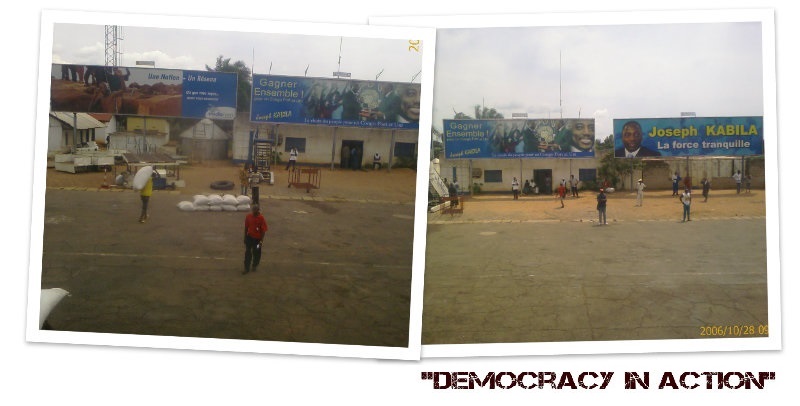
Internal Politics – Dollar is King?
Our protagonist could not have chosen a worse time to come to Congo, as in 2006 the Congolese people were voting for their new president. Well, actually he was not new per se; as the frontrunner was Joseph Kabila, the son of the well know Laurent-Désiré Kabila, who was sort of a revolutionary that overthrew the previous government, but then was killed after gaining power resulting in his son taking office until elections. In 2006 UN sent the largest ever monitoring group in history to Congo and state police presence was hiked right across the country. It seems the realities of this election are quite mysterious with tight margins between Kabila and leading opposition candidate Jean-Pierre Bemba. It was only in the second round when Kabila won, but expectedly the balloting was deemed as rigged. In 2011, Kabila won another term, but this time against another candidate, as Bemba moved to Belgium, but was arrested and tried for war crimes and crimes against humanity. Amazingly, I am told by our adventurer that Congo experienced very little fighting, albeit some heated exchanges had took place as Western media reported. At most, I was told it consisted of small skirmishes in the pre-election.
A “sexy” topic about any developing nation in academia is corruption and I could not refrain from finding out more. Interestingly, corruption in the way that we interpret it almost does not exist. Essentially, local and state governments do not take bribes or demand them as they do elsewhere, but what everyone gives and what everyone hopes to receive is a small token of gratitude for the job done. I used “small” intentionally, because the sums asked are not particularly high as we would expect for such mineral rich state. Aside from that, I will let you imagine what the political system is like in more detail, as it will require an entirely individual post, but I shall leave you with this reputed quote, this way you can make a verdict about Congo or even anywhere else:
“Capital eschews no profit, or very small profit, just as nature was formerly said to abhor a vacuum. With adequate profit, capital is very bold. A certain 10% will ensure its employment anywhere; 20% cent will produce eagerness; 50% positive audacity; 100% will make it ready to trample on all human laws; 300% and there is not a crime at which it will scruple, nor a risk it will not run, even to the chance of its owner being hanged. If turbulence and strife will bring a profit, it will freely encourage both. Smuggling and the slave trade have amply proved all that is here stated.”
T J Dunning, quoted in Karl Marx, Capital I (1976: 926, fn.)
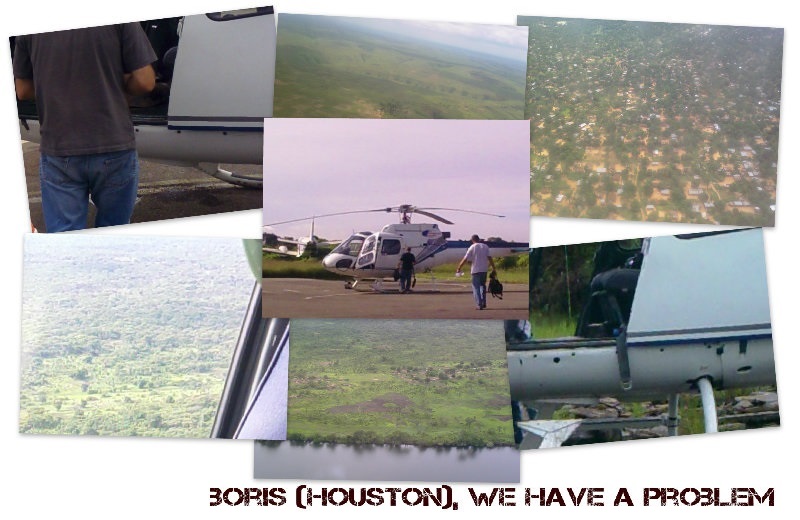
Guardian Angels Were Watching – Rough Landing:
In a typical morning of 2006, a crew consisting of our protagonist, several geologists and uncharacteristically French pilot circled around a Congolese jungle searching for a safe place to land. After spotting a tight opening amidst the Congolese vegetation, near the boarder with Zambia and Tanzania, the pilot made a decision to land. It was a very sensual place, quite and relatively cool, as a nearby a river rippled along. Like on any other day, the crew disembarked from the helicopter and went on to carry out their respective duties – basically in our simple non-technical language – to collects rocks and samples. As everyone continued working they slowly shifted away from the helicopter, until the distance was about 150-250 meters. Little did they know that their day was about to become far from typical…
As the pilot was landing he specially aimed to land somewhere safe and uninhabited, but in a matter of seconds the entire crew, with the promenading pilot, was besieged by a group of pierced and war painted aborigines, or the 'real locals'. If the pilot was playing “Deal or No Deal” on Channel 4 with Noel Edmonds, he would have opened and wasted the £250,000 in the first go with such a fine landing. Except, Noel would not have been looking at the entire helicopter crew like sardines in a weird aluminium can. I cannot describe easily with simple letters what the entire crew was experiencing, or the aborigines, as for both sides of the social divide it was an extremely frightful experience.
In the case of “the real locals” one cannot even imagine what was going through their heads. As not only something really bulky, metallic and extremely noisy just fell from the sky, but 'similar' looking individuals came out of this godly device. Moreover, in our developed world skin colour does not send shockwaves, but considering that the crew has landed in an area which has not recorded a white man’s footstep in over 100 years, it certainly made the event an unordinary occurrence for this primitive tribe.
In regards to the crew, from their standpoint the experience was even more terrifying. As this hunting party were not only armed with spears and alike, which everybody knew were more than likely to be poisoned with the commonly growing deadly plants, but they were also accompanied by dogs. Now, these are not your common dogs that you would find in your local park, with a cheerful owner who walks around with a plastic bag in one hand and a dog leash in another. On the contrary, these were wild dogs and what made them more frightening were the massive open blisters that oozed puss. If anyone was bitten by one of these animals, or struck by a cyanide arrow, the probability of survival was next to zero, considering that the nearest hospital was over 500 kilometres away. At least, the Congolese hospitals make UK’s NHS Health Care look like the finest establishment that ever existed.
At this point this story goes in what can only be described as a Hollywood film, but it was all for real. No, the crew did not make a lucky escape by fighting-off the tribe and leaving unscratched. To be honest, the notion of an Indiana Jones escape was out of the window straightaway, as even the finest pilot could not lift a helicopter into the air in under five minutes. Also, considering that the whole crew were quite far away, they would need to break Usain Bolt’s 400 meter world record – including the cheery 60 year old from Norilsk. So, how did they leave unscratched? Well, one member of the crew remembered a good old phrase from the Walt Disney’s classic film “The Lion King”. “Hakuna Matata” – when I heard this story it made me smile, but after talking with the crew and finding out that this popular phrase is used by much of East Africa, in local dialects and in Swahili it means “everything ok?”, it made sense.
In an awfully broken way the crew mixed this phrase, their knowledge of the French language and an ample supply of western ammunition, to negotiate their way out of this tricky and possibly deadly situation. Now, I do not mean real weapons, as in fact it is incredibly difficult to carry firearms in Congo, unless you are a warlord or a rebel fighter who does not tolerate laws any ways. A person can face harsh penalties and foreigners shun away from 'packing'. By ammunition I mean multi-packs of Snickers and cans of now warmish Coca-Cola. As the aborigines received their gifts with quite mystified faces, the crew slowly made their way towards the helicopter. As the pilot launched the helicopter into the skies, the tribe below stood by watching, as I am sure thinking what an unordinary day and how do I open this oddly shaped container.
Where Is Our Hero Now? Well That Is a Story For Another Day…
Thank You for Reading and I hope You Enjoyed This “Casing Point” Special!
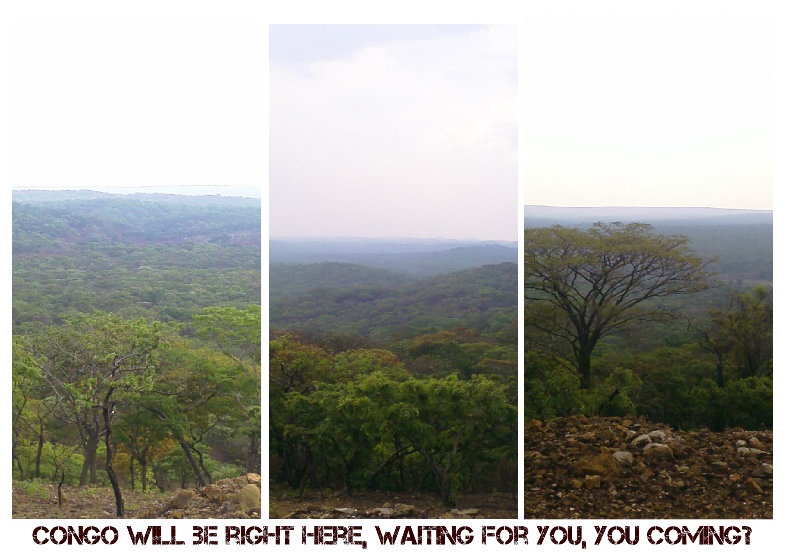
DISCLAIMER: any use of the above images, their reproduction, or alteration, is strictly prohibited, they are property of "Casing Point" and Igor Ossipov.
Igor Ossipov
M.A. University of Kent & Higher School of Economics, Oil/Diesel Broker and RIAC Blogger.




